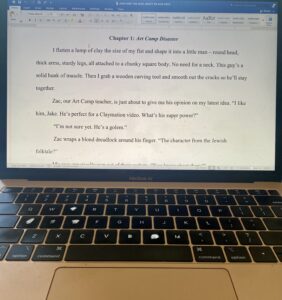 “I have to get back to work. Goodbye.”
“I have to get back to work. Goodbye.”
That’s what I say if I’m talking to someone, and it’s time to show up in my studio and write. The time is blocked out on my calendar, like any meeting or appointment. I got the idea from a writer friend while sharing our routines – and how we show up to our writer job.
Oh, the tricks I play on myself! But, they work. Well, okay, not always – especially during this pandemic, when my teaching and personal schedule are topsy-turvy, and my self-motivation is wavering. But, I keep trying. While sipping morning coffee, I turn on my studio light and open the curtains, so my office shouts, “I’m ready and waiting”. I set my alarm for writing sessions. I put my cell phone in another room, so I can’t hear the buzz of incoming texts or calls (which are perfect distractions when I’m stuck on a scene that I’ve re-written a dozen times!).
Unfortunately, the demons of distraction and procrastination still like to hang out in my office. Ugh! Good news is, I know my own worst enemies really well. Gradually, I’m learning to negotiate with them, so, my favorite co-worker, accountability, can kick them out and pull up a chair!
Here’s what accountability and I have been up to – and what’s really working:
Setting a timer. I try to follow a rigid routine during my scheduled writing time: For writing, I set a timer for one hour, take a 10-15 minute break, repeat. For research, I set a timer for a maximum of 30 minutes.
Monday accountability group. Every Monday, I do an email check-in with a group of kid-lit writers. We submit our goals for the week and report briefly on progress made the previous week. Wow! Keeps me honest and realistic! In our brief format, we manage to celebrate, challenge, and remind each other to keep plugging away, and that it’s okay to take a break.
Text-writing. Once a week, I have a writing “date” with another children’s writer. We text a few minutes before our start time to share what we’re working on or what we want to accomplish. Usually, we do two 45-minute rounds. Then, we briefly check in. We’re always amazed at how much we get accomplished in such a short time.
SCBWI Rocky Mountain Chapter critique group. Once a month, my SCBWI critique group meets in person. We’re the Story Spinners and we’ve been meeting monthly for 20 years. We email our work in advance, then, when we meet, each writer has 20 minutes for their work to be critiqued. When members don’t submit work, they can use their time to update the group on projects, invite brainstorming or advice on a project, share notes from workshops/classes, or etc. They’ve helped me think through SO many critical bits and pieces, such as how to end a pb or write a hook for a YA synopsis, a book title, an angle for a nonfiction article, and the list goes on. We hold separate meetings, as needed, to critique a member’s full manuscript.
Story Spinners are my rocks! Without their passion, drive, support, professionalism, desire to learn, confidence, nudges, wisdom and wit, I would have given up on my projects a long time ago.
SCBWI British Isles North East critique group. While living short term in England (twice), I met weekly with the same critique group. Through email, we continue to: exchange same genre manuscripts for overall feedback, check in bimonthly on current projects. We’re considering holding FaceTime meetings, as needed. They, too, are my rocks, my support group!
Oops! My alarm is going off. I have to get back to work on revising my YA. Goodbye!
Writing is hard, hard, messy work. Going out and doing talks and signing books is all wonderful, but a writer has to return home and go back to work.
—Julia Alvarez, author of AFTERLIFE, BEFORE WE WERE FREE, ALREADY A BUTTERFLY
 Revision.
Revision.

 My husband and son also volunteered to read the book, and I sent ten pages and a synopsis to an agent who was doing critiques at the RMC-SCBWI fall conference. The book was definitely stronger, but there were new elements that needed to be evaluated. I was too close to the story to know if they were working. While I waited for my readers to plow through the manuscript, I threw myself into another project.
My husband and son also volunteered to read the book, and I sent ten pages and a synopsis to an agent who was doing critiques at the RMC-SCBWI fall conference. The book was definitely stronger, but there were new elements that needed to be evaluated. I was too close to the story to know if they were working. While I waited for my readers to plow through the manuscript, I threw myself into another project.
